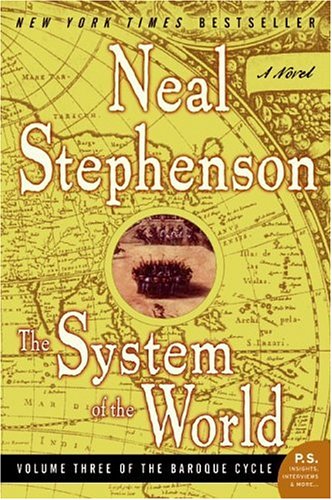Book Review: Neal Stephenson’s “The System of the World”
by Miles Raymer
Of the many reasons I do not play chess, the main one is that I’m lousy at strategy. I struggle to think more than one or two moves ahead, can’t easily reposition pieces in my mind’s eye, and am hapless when it comes to sniffing out and thwarting my opponent’s battle plan. I’ve had similar troubles trying to follow and parse the machinations of Neal Stephenson’s Baroque Cycle, the first two volumes of which I found to be dense, sprawling, and restrained in their capacity for illumination. The System of the World, however, is a worthy conclusion to this raucous verbal repast. Drawing from the best elements of the previous two books, Stephenson manages to bring seemingly disparate concepts and characters together in a fashion that feels almost magical––or alchemical.
The System of the World’s success is predicated on Stephenson’s decision to put Daniel Waterhouse front and center. Daniel is the heart and mind of this tale, the Logic Mill, the Engine for Raising Water by Fire, the vegetative spirit that animates the beast. Now an old man, Daniel returns to London to complete the task assigned to him way back in the first scenes of Quicksilver––the reconciliation of long-estranged geniuses Sir Isaac Newton and Wilhelm Gottfried Leibniz. As we expect from Stephenson, Daniel spends most of his time on ancillary pursuits and only touches briefly on this central quest. Fortunately, his other activities prove intriguing and ultimately tie into the larger story, a quality greatly lacking early in the series.
The complex shenanigans in which Daniel becomes embroiled are far less interesting than the kind of man he has become. Though I have criticized this series for what I perceive to be its many flaws, I can now say with certainty that Daniel Waterhouse is one of my favorite literary characters, and certainly my favorite from any of Stephenson’s works. He is a midwife of progress, a lesser savant who walks in the shadows of titans even as he dabs the spittle from their chins and gives them that friendly push out the door so they can keep revolutionizing human thought. He is a champion of materialism far ahead of his time, a non-violent anti-authoritarian, and a gentleman scholar. But most of all, he is a man who wants to end his life feeling he has acted in accordance with his principles and done right by those he loved. To follow Daniel through the completion of this journey is more than enough to make up for The System of the World’s shortcomings, which aren’t any more or less egregious than those of the first two volumes.
This book’s other main strength is how it throws historical perspective on notions of progress, particularly in terms of money and democracy. Though I happily make use of money and am glad to live in a democracy, I often bemoan my culture’s obsession with monetary gains and my country’s political gridlock, which is the result of a system that values the checking of power over the ability to institute political change by fiat. The System of the World reminded me that, as much as money can be a drag, the history of money is a mixed bag. Yes, it is a tool that the powerful can wield against the poor, but standardized currency also helped dethrone Europe’s aristocracy by creating an ostensibly objective form of value that could be possessed by anyone, not just bluebloods. And when it comes to politics, even a government as obdurate as our current Congress is preferable to the petty disputes and whims of monarchy. Stephenson himself acknowledges that new Systems of thought and governance will be far from perfect, but offers excellent support for the idea that we are headed in the right direction.
The conclusion of Jack and Eliza’s story is fitting, but failed to move me the way I thought it might. Jack remains a mysterious and charismatic thorn in the side of powers that be, and Eliza continues to pursue her dream of abolishing slavery. Both characters fade into the background of Daniel’s story, which is fine by me.
Given that this is the conclusion of Stephenson’s most ambitious work to date, it seems appropriate to comment on the author’s tendency to fizzle out where more prosaic writers seek climax. Endings are not Stephenson’s strong point, and the final pages of The System of the World, while containing glimpses of poignancy, are rather disappointing. Jack’s storming of the Mint in London, which occurs in the first third of the novel, is more of a traditional climax than the slow unwinding of plots and relationships that follows. The exception is the final confrontation between Newton and Leibniz, which is inconclusive but also comfortingly open-ended. The only point on which the quarrelsome prodigies can agree is that their metaphysical debate will indubitably rage long after they are both dead. I take this non-resolution as Stephenson’s nod to the spirit of ongoing scientific inquiry, a strangely satisfactory end-point for two great fuses on an Infernal Device whose explosive power would resonate for centuries.
This book did not please in all the ways I hoped it would, but it did surprise and delight me in ways I couldn’t anticipate. Stephenson has made neat work of a very messy buildup. He is a kind of wizard––or chess master––and The System of the World spells checkmate.
Rating: 8/10
